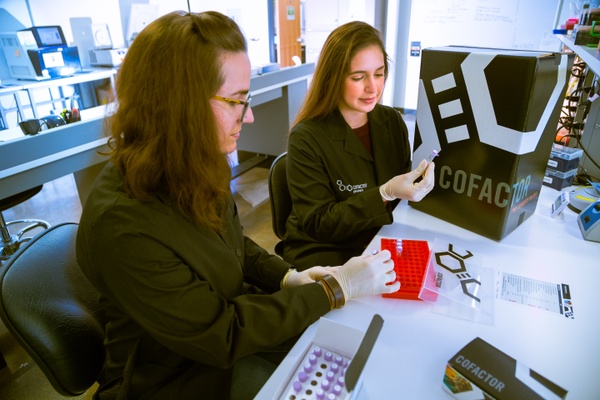SAN FRANCISCO, Calif. – April 13, 2021 – Cofactor Genomics, the company bridging the precision medicine gap, today announced commencement of the first multicenter clinical trial of its OncoPrismTM diagnostic assay, using the company’s patented approach to generating multidimensional immune biomarkers. Fifteen hospitals and healthcare networks, including Mayo Clinic, MultiCare Institute for Research and Innovation, and Revive Research Institute, are currently enrolling in the PREDAPT (Predicting Immunotherapy Efficacy From Analysis of Pre-treatment Tumor Biopsies) Trial to evaluate use of the OncoPrism test in patients with recurrent and metastatic squamous cell carcinoma of the head and neck (RM-HNSCC) to effectively predict a patient’s response to immunotherapy. The company expects additional sites to join the trial before the end of 2021.
While the trial will initially recruit RM-HNSCC patients, the protocol is approved for recruitment of patients with 10 additional indications where independent market research has identified an unmet clinical need in predicting tumor response to immunotherapy. Specimens collected in the study will be analyzed at Cofactor’s CAP/CLIA accredited laboratory.
“Opening recruitment for the PREDAPT study is a significant milestone for Cofactor. It represents not only the world’s first Predictive Immune Modeling clinical validation study, but the first of many studies we intend to sponsor. These studies will lead to predictive diagnostics that are undeniably needed in the field, for therapies that are in development or those already on the market,” stated David Messina, PhD, Cofactor’s Chief Operating Officer. “Physicians do not currently have adequate information to predict tumor response to immune checkpoint inhibitors, resulting in ineffective and inconsistent treatment. This is ultimately a heavy burden on both patients and the healthcare system that supports them; we intend to change that.”
The study includes both retrospective and prospective specimen collection, but does not require any additional visits or surgery outside of standard care for enrolled patients. The PREDAPT trial builds on preliminary results recently presented that showed the performance of a multidimensional RNA biomarker built using the company’s Predictive Immune Modeling approach was more effective than the on-label PD-L1 immunohistochemistry (IHC) assay in predicting tumor response to anti-PD-1 therapy in RM-HNSCC.
PREDAPT is uniquely designed to be a decentralized study. To enable that, Cofactor has contracted Curebase as the CRO partner, who enables highly virtual clinical trials by offering a full-service CRO and eClinical Platform, complete with eConsent, electronic data capture, and remote monitoring capabilities. This enables individual investigators, who may be passionate about science and improving patient outcomes, the ability to participate in the clinical trial even if their hospital is unable to participate as a traditional clinical site. It has also enabled Cofactor to establish two major recruitment streams to ensure maximum diversity and streamlined recruitment, traditional clinical sites and direct-to-patient recruitment.
“The PREDAPT study is exactly what we had in mind when we built the Curebase platform. Using software-powered, decentralized research methods, we are proving with Cofactor that any patient can be part of a clinical trial no matter where they live,” noted Tom Lemberg, CEO at Curebase.
Despite the thousands of new clinical trials that are started every year and the significant advances made in launching innovative therapies such as immunotherapies, physicians are still prescribing the wrong therapy to more than 80 percent of patients.1 The gap in matching these innovative therapies to the patients that will benefit (and avoiding those who will not respond or may have adverse reactions) is a major problem in healthcare.
“Technologies that are capable of playing matchmaker and bridging this gap are key,” said Jarret Glasscock, PhD, Cofactor’s Chief Executive Officer. “The field of Predictive Immune Modeling is building this next generation of predictive diagnostics that are showing an enhanced ability to accurately predict patient response prior to treatment. We expect these technologies to not only improve patient treatment paths, but to also provide cost savings to the entire healthcare system.”
Sites interested in joining this high impact study may contact clinicaltrials@cofactorgenomics.com or express their interest here.
Reference
1. Haslam A, Prasad V. Estimation of the Percentage of US Patients With Cancer Who Are Eligible for and Respond to Checkpoint Inhibitor Immunotherapy Drugs. JAMA Netw Open. 2019;2(5):e192535. doi:10.1001/jamanetworkopen.2019.2535
Cofactor Genomics is on a mission to close the Precision Medicine Gap through Predictive Immune Modeling. Cofactor has leveraged its experience as one of the first CAP-certified, clinical RNA sequencing laboratories to develop new methods that accurately and holistically characterize disease. Instead of searching for isolated, single-analyte biomarkers, Cofactor’s products create multidimensional biomarkers that better capture the complex immune response. Cofactor has spent years pioneering the molecular and machine learning tools to build a database of Health Expression Models, now integrated into our multidimensional diagnostics. Cofactor Genomics empowers clinicians to be better informed while making treatment decisions to improve patient outcomes.




